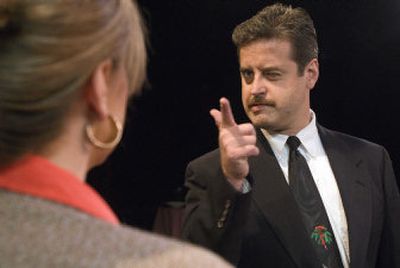Romantic it isn’t

Any new production of Wendy Wasserstein’s “Isn’t It Romantic” is bound to be bittersweet and poignant.
First, it will remind us of the American theater’s loss – Wasserstein died of lymphoma earlier this year at age 55.
It will also remind us, with every scene, just how much things have changed in women’s lives since it premiered in 1983.
The idea that women could have it all – marriage, children, full-time careers and a rich intellectual life – was current among young women at the time. This play provided an early warning about the difficulties ahead.
“Harriet,” says one mother to her grown daughter, “that’s just your generation’s fantasy.”
Maybe things haven’t changed so much after all. “Isn’t It Romantic,” which opens Friday at the Civic Theatre’s Firth Chew Studio Theatre, may be rooted in 1983 but its situations are by no means outdated.
A 2001 off-Broadway revival had plenty to say to today’s audiences, according to New York Times critic Bruce Weber.
“It isn’t romantic, exactly, but it isn’t merely nostalgic, either,” he wrote.
Wasserstein never intended “Isn’t It Romantic” to be, literally, romantic. The title is a play on the classic 1940s Rodgers and Hart song of the same name. Yet Wasserstein’s title lacks the question mark at the end, which turns it into more of an ironic statement, or, as Weber wrote, “a gently sarcastic shoulder shrug.”
The story centers around two 20-something women: Janie Blumberg, a rumpled, aspiring writer, and her childhood friend Harriet Cornwall, who has ambitions of corporate climbing.
We also meet the two men in their lives, neither of them totally satisfactory. In fact, one of them is married.
Both women are coming to terms with what role men – and romance – will play in their lives. They also struggle to find their own definitions of happiness and fulfillment.
Their parents provide advice, of varying degrees of usefulness, along the way. Janie’s mother, the free-spirited Tasha, is an especially important character.
The Civic’s production is directed by Todd Jasmin and features Rebecca McNeil as Janie, Juli Wellman as Harriet and Evelyn Renshaw as Tasha. The cast also includes Mark Hodgson, J.P. O’Shaughnessy, Jackie Davis, Dave Rideout and Jhon Goodwin.
Janie is clearly Wasserstein’s alter ego, and watching her character through this play may prove to be particularly poignant. Some of Wasserstein’s life choices are presaged in this play. She never married, had great professional success (she won a Pulitzer Prize in 1989) and had a child at age 48.
“Her heroines – intelligent and successful but also riddled with self-doubt – sought enduring love a little ambivalently, but they didn’t always find it, and their hard-earned sense of self-worth was often shadowed by the frustrating knowledge that American women’s lives continued to be measured by their success at capturing the right man,” wrote Charles Isherwood in a tribute in The New York Times the day after she died.
“Ms. Wasserstein drew on her own experience as a smart, well-educated, funny Manhattanite who wasn’t particularly lucky in romance to create heroines in a similar mold, women who embraced the essential tenets of the feminist movement but didn’t have the stomach for stridency.”
Her work earned a wide, popular audience, helped by TV versions of “The Heidi Chronicles” and “An American Daughter.” She became a beloved and warm-hearted fixture in the New York literary and theatrical worlds.
The night after she died, the lights of Broadway were dimmed in her honor.